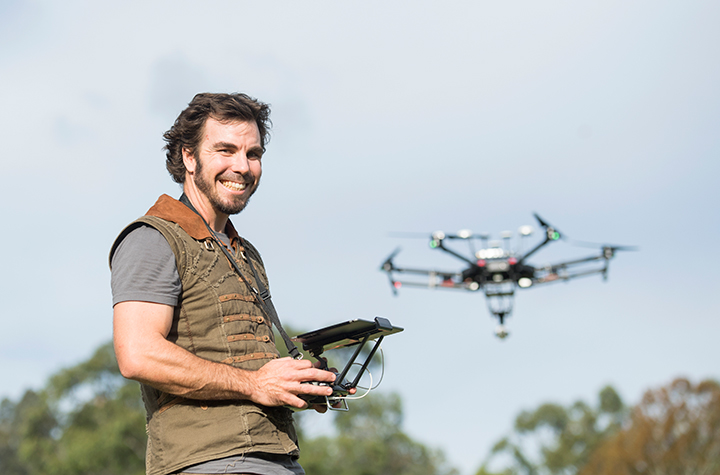Southern Cross PHD researcher brings together the latest shark surveillance technology
Share
/prod01/channel_8/media/scu-dep/news/images/2020/drone-view-shark-andrew-colefax-720-475.jpg)
After four years of intense research and development we now know more about the behaviour of sharks than ever before.
Southern Cross University has spearheaded a technology-based marine study in developing drones for shark surveillance in collaboration with the NSW Department of Primary Industries (NSW DPI), that may prove to be a life saver this summer.
Technology is now almost at a point where marine animals can be reliably detected and identified in real-time from drones using sophisticated 'eye in the sky' artificial intelligence software. According to Dr Andrew Colefax autonomous surveillance is now edging closer which would allow drones to patrol for longer periods over longer stretches of coastline without requiring a ‘line-of-sight’ operator.
'Eye in the Sky AI' (note: video has no audio)
“The majority of shark encounters tend to involve board riders rather than swimmers, so it’s important that we develop technology with the intention to provide surveillance beyond the red and yellow flags and hours of beach patrols,” Dr Colefax said.
“The main thing standing in the way of a more autonomous surveillance system is CASA regulations and safety around air traffic management. Drone technology is already at a point where drones can charge themselves, take off and fly a set course, and land without an on-the-ground pilot.
“In the short-term, the goal is for machine learning software to assist drone pilots to obtain reliable detection and identification of shark species to improve situational decision making on beach management.”
Dr Colefax, who completed his PhD at the University’s National Marine Science Centre in Coffs Harbour, is continuing research and development on non-destructive shark-bite mitigation through Sci-eye, a cross-disciplinary collaboration with astrophysicists Dr Cormac Purcell and Dr Andrew Walsh and Dr Paul Butcher. This collaboration is an extension from a partnership between Macquarie University and the NSW DPI that utilised the data from the drone trials that were part of Dr Colefax’s PhD with Southern Cross University.
 Andrew Colefax
Andrew Colefax
“We are seeing drones monitoring shark movements in more and more stretches of the coastline. A beneficial by-product of all this will be detailed monitoring of marine life off our coastal beaches, which will be highly valuable in assessing and managing any negative impacts and change," Dr Colefax said
The team, with support of the NSW DPI, is focused on improving the detectability of sharks and also delivering the machine learning tool to lifeguards and other beach authorities.

/prod01/channel_8/media/scu-dep/current-students/images/Coffs-harbour_student-group_20220616_33-147kb.jpg)
/prod01/channel_8/media/scu-dep/current-students/services/counselling/images/RS21533_English-College-Student_20191210_DSC_6961-117kb.jpg)
/prod01/channel_8/media/scu-dep/study/scholarships/images/STEPHANIE-PORTO-108-2-169kb.jpg)
/prod01/channel_8/media/scu-dep/study/arts-and-humanities/images/RS20958_Chin-Yung-Pang-Andy_20190309__79I5562-960X540.jpg)
/prod01/channel_8/media/scu-dep/experience/images/SCU-INTNL-STUDY-GUIDE-280422-256-72kb.jpg)
/prod01/channel_8/media/dep-site-assets/component-library/screenshots/online-1X1.jpg)
/667x0:3334x2667/prod01/channel_8/media/scu-dep/news/images/2026/VC-Tim-Julie-2WEB.jpg)
/484x0:1516x1032/prod01/channel_8/media/scu-dep/news/images/2026/korean-symposium.jpg)
/484x0:1516x1032/prod01/channel_8/media/scu-dep/news/images/2026/Untitled-1.jpg)
/514x0:1487x973/prod01/channel_8/media/scu-dep/news/images/2026/Smart-glasses_credit-Saif71-pqnOLJjplq0-on-Unsplash-2000X973.jpg)
/484x0:1516x1032/prod01/channel_8/media/scu-dep/news/images/2026/fish.jpg)
/514x0:1487x973/prod01/channel_8/media/scu-dep/news/images/2026/Ziggurat_credit-Hasanmajed-m_BCk7v2BFw-on-Unsplash-2000X973.jpg)
/484x0:1516x1032/prod01/channel_8/media/scu-dep/news/images/2026/67800-yr-old-hand-stencil-5--2000px-x-1032px.png)
/484x0:1516x1032/prod01/channel_8/media/scu-dep/news/images/2026/67800-year-old-hand-stencil_for-TC_2000px-x-1032px.png)
/484x0:1516x1032/prod01/channel_8/media/scu-dep/news/images/2026/tc-article.jpg)
/514x0:1487x973/prod01/channel_8/media/scu-dep/news/images/2025/PhD-student-Johannes-Dittmann-measuring-methane-fluxes-in-tropical-wetland-credit-Luke-Jeffrey-Southern-Cross-University-2000X973.jpg)